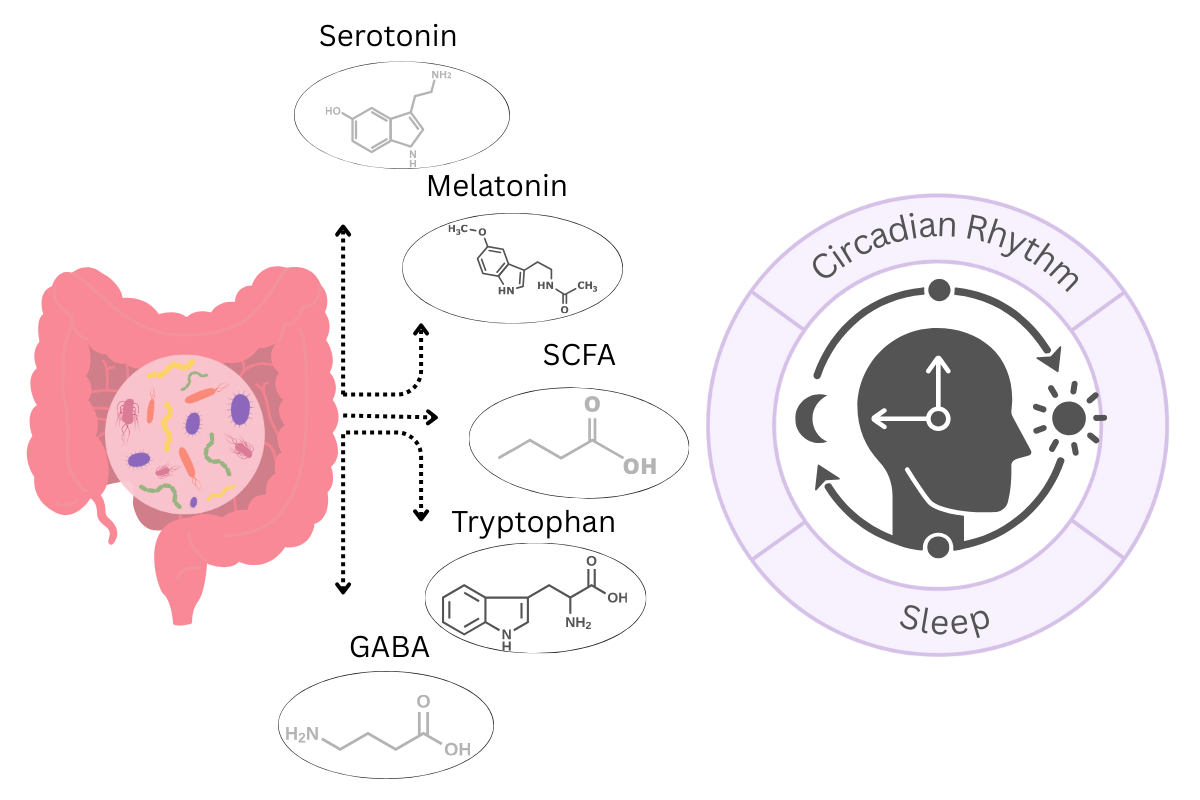Alterations in gut microbiota composition have been linked to a range of health conditions. Emerging evidence also indicates that both sleep quantity and quality are associated with the composition of the gut microbiome. Recent studies have highlighted the importance of a healthy, balanced microbiome in supporting sufficient sleep and overall health.
Circadian rhythm disruptions arising from factors such as poor diet, excessive screen time, shift work, jet lag, or irregular mealtimes can negatively affect microbiome composition. In turn, the gut microbiota can influence sleep quality and circadian rhythm through the production of metabolites such as serotonin, melatonin, short-chain fatty acids (SCFAs), and gamma-aminobutyric acid (GABA). These metabolites interact with the central nervous system via enteroendocrine cells, which act as sensors and responders to the gut environment.

Short-Chain Fatty Acids (SCFAs):
SCFAs are produced when the gut microbiota ferment undigested fibre, including acetate, propionate, and butyrate. Research has shown that butyrate can induce non-rapid eye movement (the first 3 stages of sleep). SCFA can also influence sleep by affecting the production of serotonin and GABA. Prebiotic supplementation in mice positively regulates the circadian clock through the rhythmic production of SCFA.
Serotonin:
90% the body’s serotonin is generated by enterochromaffin cells which are present in the gut, and the gut microbiome can regulate the synthesis of serotonin in these cells. Microbial activity stimulates the expression of tryptophan hydroxylase, the rate-limiting enzyme in serotonin biosynthesis, thereby influencing circulating serotonin levels. As serotonin plays a key role in regulating sleep–wake cycles and promoting wakefulness, alterations in gut microbiota composition may indirectly impact sleep quality and timing.
Melatonin:
Melatonin is the precursor to serotonin and is also produced by the enterochromaffin gut cells. Its secretion correlates with food intake; for example, late-night eating can disrupt melatonin secretion and negatively impact metabolic processes. As a result, the gut’s microbial balance affects melatonin levels.
Gamma-butyric acid (GABA):
GABA is the primary inhibitory neurotransmitter of the central nervous system, essential for reducing neuronal excitability, promoting a sense of calm. Research has found that specific microorganisms, such as Lactobacillus and Bifidobacterium, can secrete GABA, influencing its availability. This is significant, as reduced GABA levels are associated with sleep disturbances, and studies indicate that these bacterial genera may contribute to improved sleep quality through GABA-mediated pathways.
Collectively, these findings suggest that the gut microbiome plays an active role in regulating sleep through multiple biochemical pathways, highlighting its potential as a target for improving sleep health and overall wellbeing.
